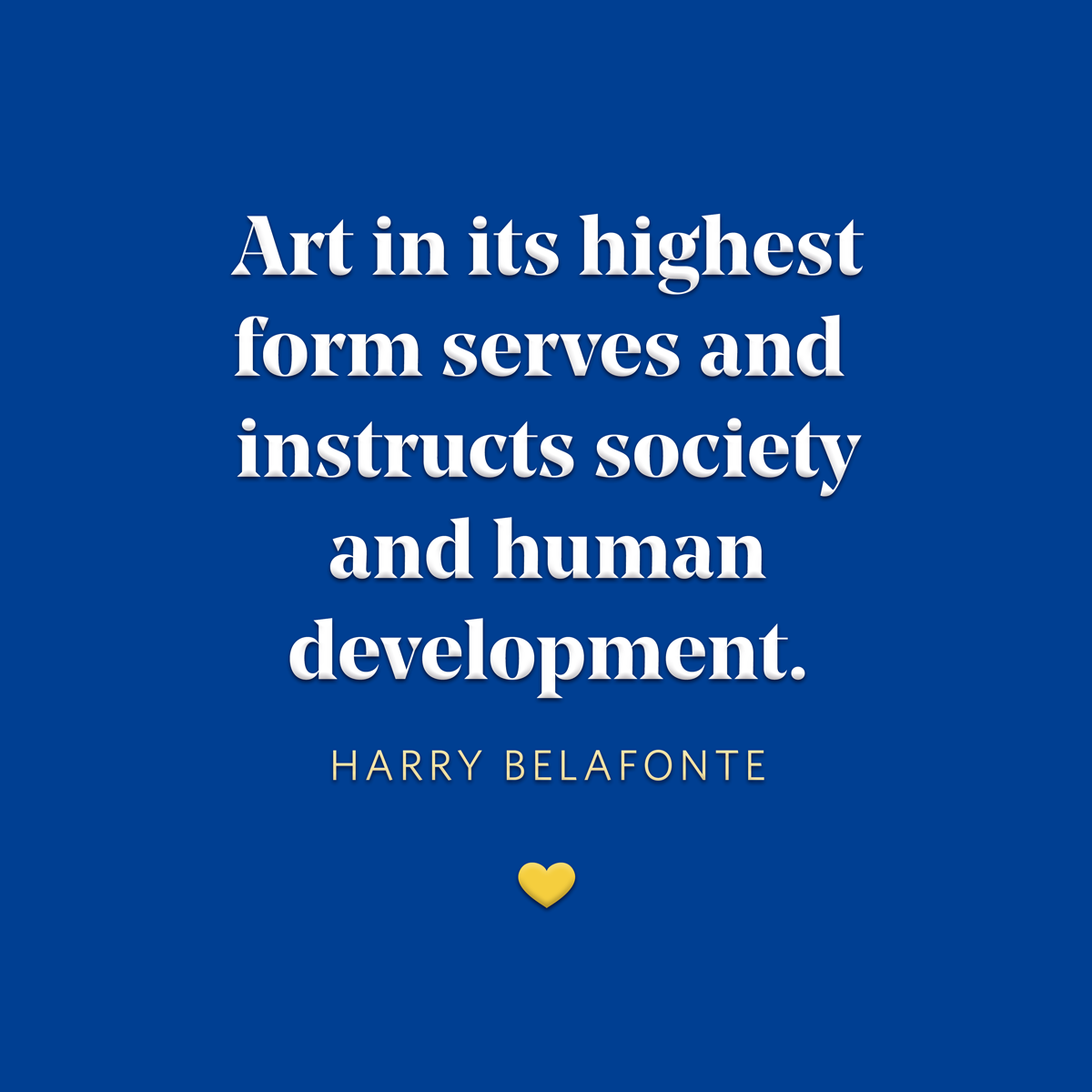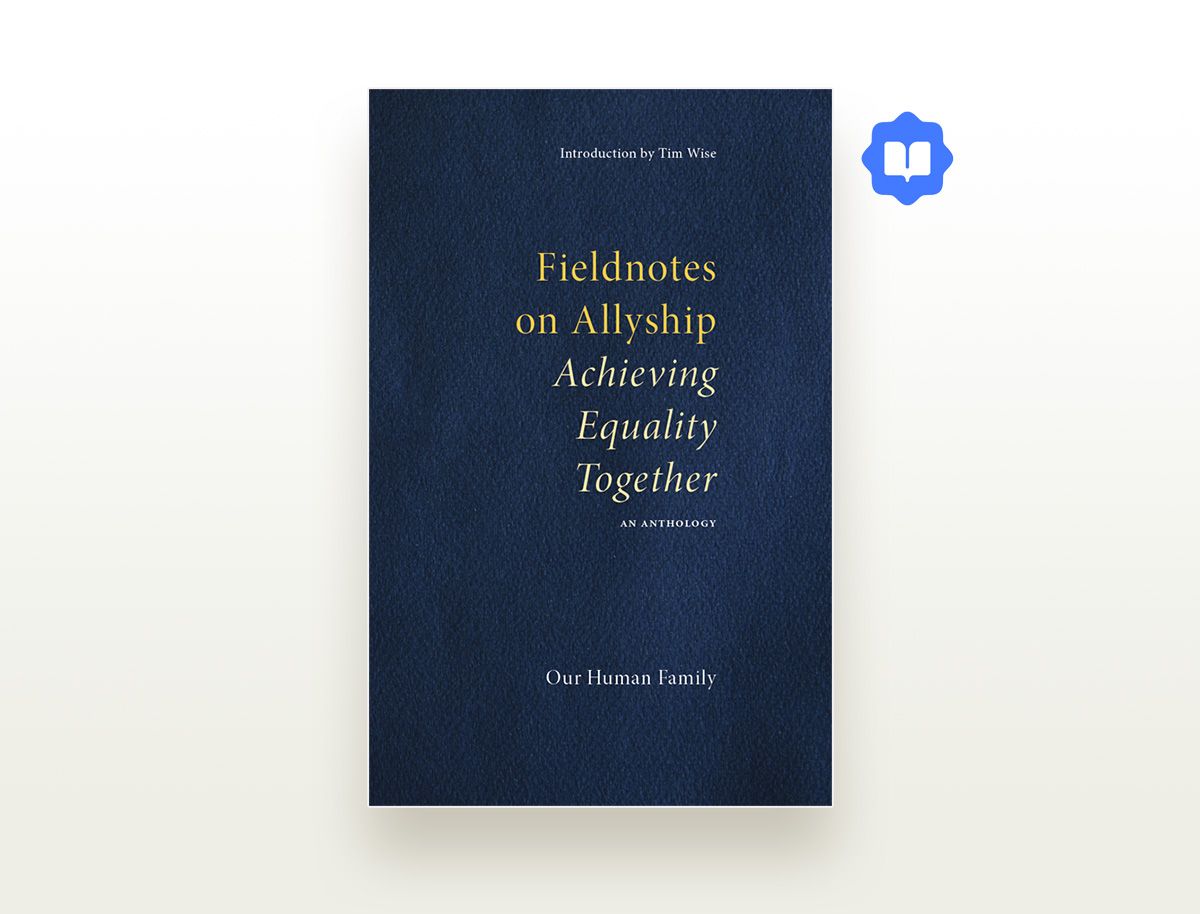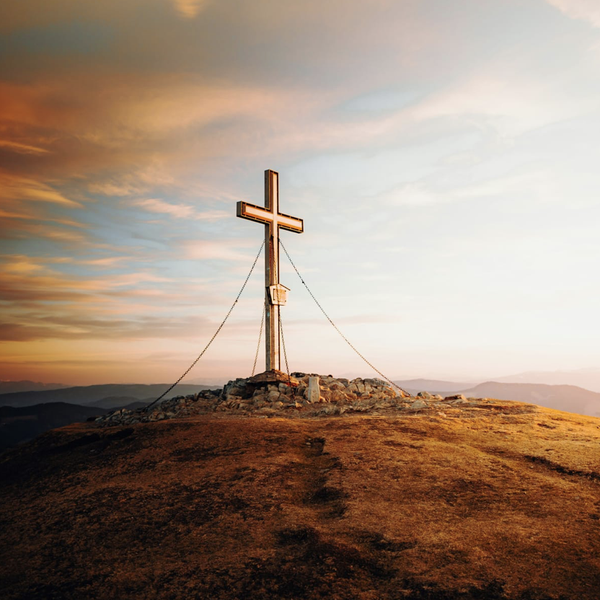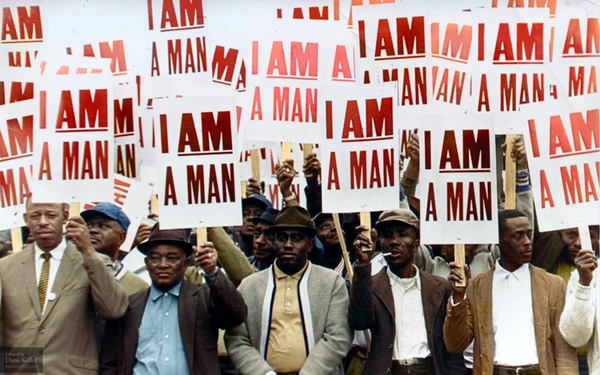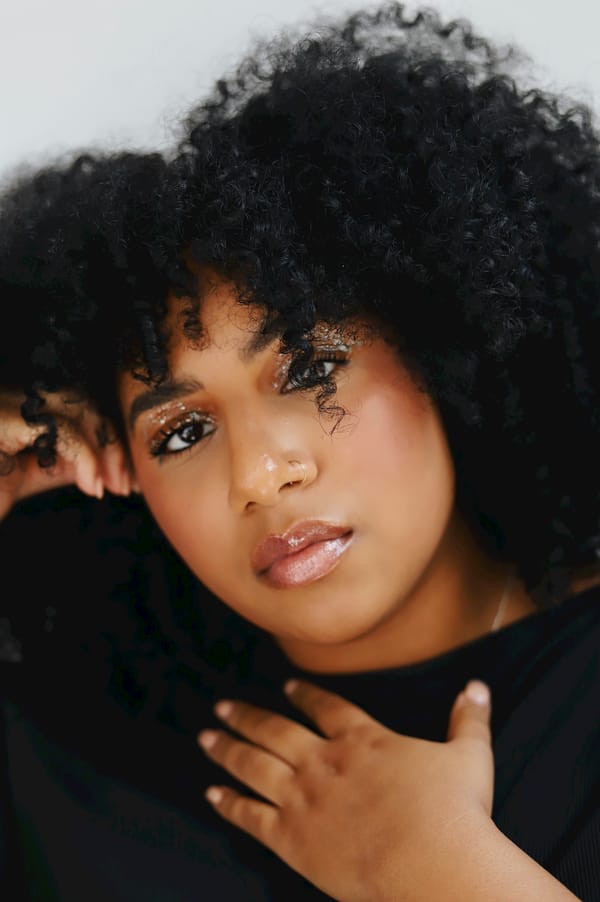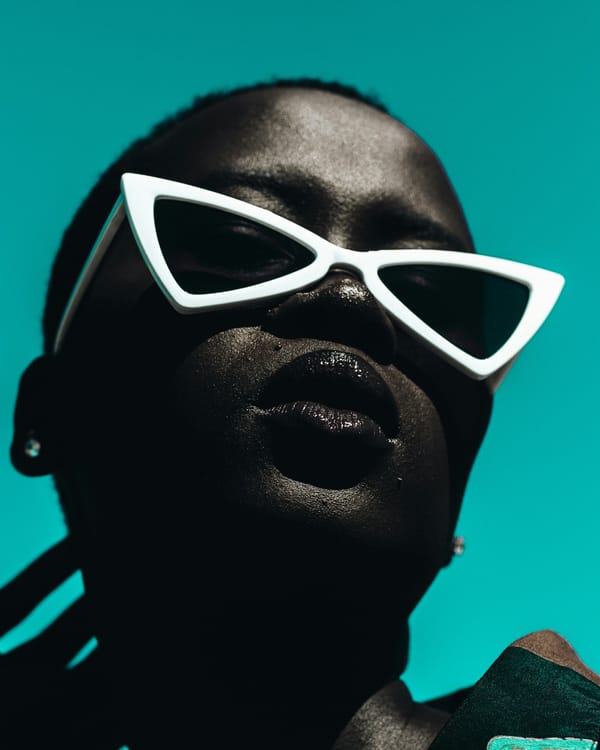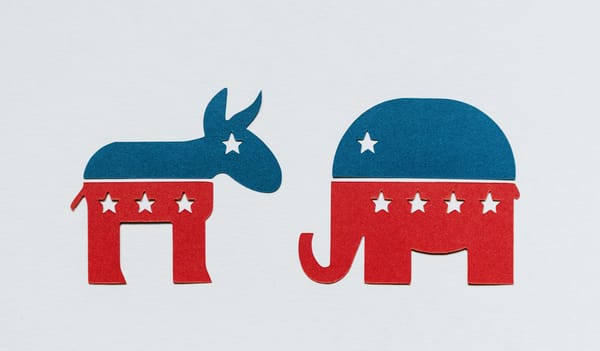OHF Weekly, Vol. 5 No. 17: Editor’s Letter and a quote by Harry Belafonte
Editor’s Letter
💛 Greetings!
Recently Medium rolled out a new feature: becoming a verified book author. I am beyond thrilled to announce that Our Human Family, Inc. (OHF) made the cut—thanks to our book Fieldnotes on Allyship: Achieving Equality Together and the authors who made it possible!
The process for verification is pretty straightforward. You fill out the application with all the required information, click submit, and try not to chew your fingers off while waiting for a reply.
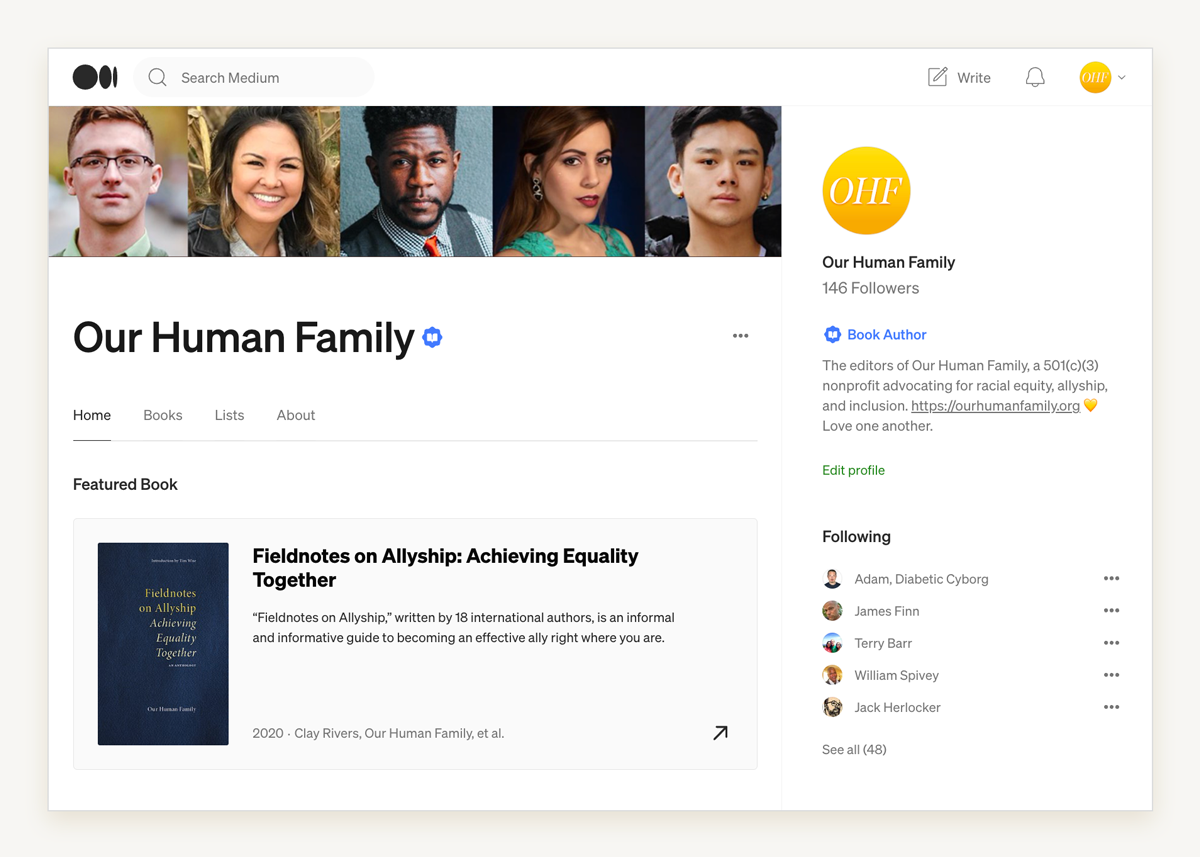
I received a notification last week that we didn’t make the cut, but instead of emailing an impersonal letter, they took the time to send an email that included the reason why the application was rejected: an incorrect/invalid ISBN. I knew Fieldnotes had been issued a valid ISBN as I purchased it directly from Bowker. Whether I submitted that ISBN or one of Amazon’s numbers, I couldn’t recall. But I responded to the notification email with the correct ISBN and resubmitted my application.
The verification folks were more than accommodating. They re-processed the application, notified me of the verification rather quickly, and thanked me for being on Medium. It was all a rather pleasant experience.
The only other hiccup was that Fieldnotes on Allyship is an anthology with eighteen co-authors. The Medium format only allowed for the inclusion of four names max, but for some reason, none of the other names were posted.
So . . . I’d like to take a moment to give each of the Fieldnotes on Allyship contributing authors their flowers with this look behind the book.

On the Authors of Fieldnotes on Allyship
Sherry Kappel, OHF Weekly Managing Editor. For those of you who don’t know Sherry, she — is — incredible. Sherry is a poet, essayist, and fiction writer with an MFA from the University of Pittsburgh. She looks for the best in humanity and is driven by empathy in her writing and in life. Sherry penned the book’s preface and Chapter 14, “So You Want to Help: Let’s Get Moving.” Full stop.
Her work is on Medium, where she edits Snapshots, the Haiku Hub, and special projects for Our Human Family/OHF Weekly. She’s also a hockey aficionado and baker extraordinaire. Sherry edited Fieldnotes and managed all the contributing writers—and me, namely in the area of getting me to reconsider decisions after I’ve dug my heels in. Trust me, it’s a well-honed skill.

Stephen Matlock, former OHF Weekly Senior Editor. Steve and I first connected via Twitter before the Medium publication Our Human Family or the nonprofit Our Human Family, Inc. was a thing. He shared a story with me about his awakening to the strictures of white evangelical conservative-ism and its biases and embracing a worldview that values the lives, cultures, and lived experiences of Black, Indigenous, and People of Color without ignoring the injustices wrought upon those groups by white folks.
Based on that one story, which later became “My Journey into Blackness,” I invited him to join OHF. What I didn’t know was that the guy was a full-time, professional editor–SCORE! Steve’s editorial contributions and facility with words can still be found all throughout our online and print publications. Steve served as the second set of eyes—and marking pen—to edit Fieldnotes.

Tim Wise is among the most prominent anti-racist writers and educators in the United States. He is the author of nine books, including Dispatches from the Race War, Dear White America: Letter to a New Minority, and his highly acclaimed memoir, White Like Me: Reflections on Race from a Privileged Son. He’s also a proven old friend of Our Human Family,. He has denied us nothing in lending his voice to OHF. Tim penned Fieldnotes’ gripping, take-no-prisoners introduction.

Consuelo G. Flores, the youngest of ten siblings in a Mexican immigrant family, is a multidisciplinary Legacy Artist of the world-renowned Self Help Graphics & Art in East Los Angeles, honored for her decades of cultural work. She is the former Director of Policy, Strategy & Analysis in the Equity & Inclusion Department at SAG-AFTRA, and has promoted diversity in the entertainment industry since 2000.
Consuelo is the only writer on this project I knew long before Medium was a twinkle in Ev’s eye. Her passion for life, family, and friends is unparalleled and she brings that passion along with the wisdom and insights only the matriarch of a multiracial, multicultural family possesses to her chapter, “Awareness and Education: Creating a Creating a Beautiful Future,” in which reveals how she developed her inclusive worldview.

Michael Greiner, Ph.D., J.D. combines practical experience with scholarship. As a political activist, he managed campaigns all across the country, worked on Capitol Hill, and served as Deputy Mayor of Warren, Michigan’s third-largest city. As an attorney, he practiced bankruptcy law, founding his own firm that’s helped thousands of families and businesses restructure their debts. As a scholar, his research has been published in top journals, including The Harvard Business Review, The Journal of Business Strategy, and The Journal of Business Research.
Michael’s informative and accessible writing style first caught our attention on the writers’ platform Medium. When approached about submitting an article for our digital publication Our Human Family, he obliged, and quickly became a fan favorite. His specialty is examining political and historical narratives, separating fact from myth, and presenting the truth in a new and exciting way. Michael wrote Fieldnotes on Allyship’s eye-opening first chapter, “What They Don’t Teach in History Class.”

Christienne Leigh Hinz is the daughter of a surgical nurse, the granddaughter of a cook, the great-granddaughter of a laundress, the great-great granddaughter of a teacher and the great-great-great granddaughter of a midwife emancipated from slavery. She earned a Ph.D. in modern Japanese history from Ohio State University, the second African American woman in the United States to do so.
I’m a firm believer in Providence. The outline for the book was still amorphous and discussions about who would participate hadn’t even begun. I don’t remember how or why, but I stumbled across an essay by Christienne that was a mash-up of wisdom, common sense, lyrical beauty, humility, with a light dusting of magic. I called Sherry all giddy, screaming, We have to have this in the book! We have to have this in the book!
There was no other explanation for finding Christienne’s essay at that precise moment, except that it was meant to be. She must’ve thought I was raving lunatic. Christienne’s chapter, “You Can Know Me” obliterated the falsehood that the Black experience is eternally unknowable to other ethnicities. We recently published the full unexpurgated 3,500-word essay with its original title. It. Is. Flawless.

Marley K wrote articles on Medium.com that focused on race, equality, government, politics, policy, life lessons, anti-racism, and current events. Her articles were featured on e-zine sites including Level, ZORA, Our Human Family, and Age of Awareness. She contributed articles about race relations in America as well as understanding and dismantling white supremacy. Her articles balance information mixed with hard truths.
Marley’s chapter, “The Secret Lives of Black Women,” is true to form in its examination of struggles, victories, indignities, and sisterhood unique to Black women. We went back and forth over whether to address the chapter’s raw and powerful emotion. And we stopped ourselves and realized that racism is a horrific institution and its effects are no less horrific, but to not share that in contrast to the character of Black women would be a disservice to their sisterhood.

Joel Leon (Joel L. Daniels) is a performer, author, and storyteller who writes and tells stories for Black people. A Bronx native, Joel has collaborated with The Gates Foundation and HBO, and has appeared on NBC’s TODAY, Insider, and Sirius XM. His writing has been featured in Forbes, Newsweek.com, HuffPost, Blavity, BBC News, and Medium. His recent TED Talk on healthy coparenting has been viewed over 1.2 million times globally, and he is the author of Book About Things I Will Tell My Daughter and God Wears Durags, Too.
I don’t remember when or what the first thing was that I read by Joel, but I was hooked. And I remember devouring more and more of his writing. It was intoxicating, gravity-defying, soulful, daring, and brimming with love. There were words within words, word play on a level yet to be explored. I was mesmerized. Sherry and I were discussing the ending of the book, as we wanted to end the book with not justa bang, but an emotional high. After all the history, angst, self-disclosure, epiphanies, and pain, we wanted to send readers off feeling empowered. The discussion was brief because only one name came to mind: Joel. We weren’t sure if he’d do it, but he said yes. And his chapter, “An Ally’s Manifesto,” the last in the book, was born. It’s a masterpiece.

Kim McCaul is of German and Irish descent and resides in Adelaide, Australia. He has spent the past twenty years working as an anthropologist on land rights and heritage matters with Aboriginal people across Australia. He is an author (Multidimensional Evolution: Personal Expirations of Consciousness), mediator, facilitator, and podcaster with a passion for reconciliation, universalism, cross-cultural bridge building, consciousness exploration, and our collective evolution.
Even now, when white people pick up the antiracism mantle and call out the racist behavior in other white folks, it leaves me slackjawed. But when they write about it and sign their names to it, that takes cojones. Kim McCaul writes that way. His writing is the farthest thing from vulgar, but he strips away all pretense and defensiveness to reveal the unadorned truth. Based on an article he wrote about an exchange he witnessed on a San Francisco city bus, we knew he was our man to write about what it takes to leave racism. The chapter he delivered, “Shame as a Path to Healing Racism,” surprised us in its candor and the author’s unexpected self-disclosures.

John Metta has degrees in Geology, Anthropology, Geography, and Ecological Engineering. He served in the Army during Desert Storm as a surgical technician and in the Navy as a submariner. A lover of learning, he has worked as a cook, underwater archaeologist, hydrologist, and software engineer. He lives in Oregon with his wife, children, and pet fountain pen.
It is impossible and pointless to publish a book about racism and allyship without addressing white privilege and white supremacy. Metta had demonstrated a deep and thorough understanding of the two that in my opinion rivaled that of James Baldwin. Again, another obvious yet intimidating choice, given his then massive Medium following. But once again, Providence intervened, and John joined the project. His chapter, “The Freedom to Be: Defining White Privilege and White Supremacy,” unfolds with the beauty of a rose first blooming.

Lecia Michelle writes and speaks about system racism so future generations will have a better chance at fulfilling their dreams. As a Black woman, she is passionate about the fight against racism and oppression. Knowing its effects firsthand, she is committed to its destruction. Lecia is one of those writers who always delivers. Every time. It’s been my experience with Lecia that if she turns in a final draft at the deadline, she’s late; meaning she always, without fail, turns in her drafts early.
With each of the pieces she’s written for Our Human Family, she hit it out of the park. We knew we had to ask her about being involved with the project. I didn’t find out until well after her chapter was submitted (and I think the book was also published) that the subject we asked her to write about wasn’t a favorite of hers. The news stunned me because her chapter, “The Blight of Systemic Racism,” far exceeded my expectations in every imaginable way based on the brief prompt we provided. But hey, what can I say? Lecia Michelle is the consummate professional—and her chapter came in early. And immaculate.

Aisha Paz is a brilliant young Black woman from Brazil who wrote her Fieldnotes chapter, “The Role of Protests,” in her second language of English at the ripe old age of seventeen. Despite growing up in the infamous favelas (Brazilian slums), just a few of Aisha’s accomplishments include being chosen as a youth ambassador to America, founding a group for gender equality, working as a nurse, sitting on an international committee in support of women’s health, and receiving full scholarships to two prestigious American universities.
She is now enrolled full time at Wellesley College for women in Massachusetts, focusing on the sciences, and resides with Sherry’s family in North Carolina in-between semesters. She is also an amazing artist, cook, animal lover, and deeply caring individual with an incredible future before her.

Clay Rivers is an author, award-winning art director, accidental activist, president of the nonprofit organization Our Human Family, Inc., founder and editorial director of the Medium publication of the same name, and the recently launched OHF Weekly. The nonprofit and its online and print publications reflect three of his core beliefs:
- We are more alike, my friends, than we are unalike.
- People change when they want to change, when they believe change is possible, and when they know how to change.
- Christ’s command to love one another.
His desire to publish Fieldnotes on Allyship was born from the grief of George Floyd’s murder. There was no chance he’d participate in the public demonstrations, as being surrounded by that many butts and elbows at any such gathering would be too much to bear. But he felt he had to do something. With years of experience as a print art director and writer, publishing a book was the ideal choice.

Glenn Rocess is retired Navy, has traveled five continents, and has worn many hats, including as a steam plant supervisor, LAN administrator, OSHA inspector, foster parent of medically fragile children, and an adult family homeowner. More importantly, he is a dad, a husband of thirty-one years, and fears absolutely nothing except his wife’s guilt trips.
Glenn and I first crossed paths on Medium, when we rigorously and respectfully butted heads over some fine point of contention. Oddly enough, several months later Glenn was the first writer to submit an article for Our Human Family. You’ve read of my belief that people can leave race-based biases and embrace a more egalitarian worldview. Glenn’s chapter, “The Cancer That Is America’s Criminal Justice System,” is all the proof anyone needs.

William Spivey resides in Florida and has a Bachelor of Arts in Economics from Fisk University. He who was once just a basketball player, transformed himself into a historian and writer because that is what was required. He also has eight grandchildren—all girls.
While history may be his niche, his stock-in-trade is keen wit and dry humor. His delivery through the written word is ofttimes so subtle, a reader unfamiliar with his style or body of work might do a mental double-take and ask, “Did he just say—?” To which the answer is always an enthusiastic, “Oh, yes he did!”
William’s chapter, “The Origins of Whiteness,” does not read like a stand-up comic’s script, but his sense of irony works well in pointing out the foibles of America’s past and present.

Charles Estacious White is an educator with twenty-seven years of experience. He has been a classroom teacher, school administrator, and language arts to incarcerated students at a local juvenile detention center, and is now an in-school suspension supervisor. He has been a writer for almost thirty years. He has won several poetry slams over the years, including one of six prizes in Westside Showroom’s new play festival in 2018. He is a devoted husband of twenty years and the father of three children.
There’s no way we could publish a book about allyship and racism without including a chapter on education, white spaces, and black students. Charles’ nearly three decades of experience across all areas of the education system made him a credible and obvious pick for his chapter, “Educating Black Students in White Spaces.”

Jesse Wilson is a Charted Mechanical Engineer and now an IT professional, with a late passion for and love of writing. Since 2018, he has published poems and essays about equality, personal development, and happiness. As an active Masters athlete, he strives to live and fulfill his goal to be the best version of himself while inspiring others to do the same.
Jesse, a Briton, lives in Great Britain and brings a wealth of knowledge about the experiences of People of Color abroad. Every writer has a unique writing “voice,” and from the very beginning, I took note of the youthful optimism that permeates Jesse’s writing. Mind you, I’m not referring to a doe-eyed naiveté but a positive outlook based on practical knowledge of what people can achieve when they understand how to remedy a situation.
His chapter, “Understanding Microaggressions and Their Impact,” candidly pulls apart the subject matter with purpose, empathy, and clear-eyed thinking.

Sylvia Wohlfarth is a social anthropologist, teacher of English for Speakers of Other Languages, and intercultural dialogue facilitator. Her passion is to express herself in writing and raise awareness of the world’s injustices, championing the marginalized and voiceless. She is driven by her love and humor. Half-Irish, half-Nigerian, Sylvia, born in Nigeria, now lives in Ireland after forty-two years in Germany.
Despite her extensive experience as an academic, she can communicate in a manner that resonates with readers’ heads and hearts. In “What Not to Say,” Sylvia’s chapter on the power of words, contains real-world anecdotes recalling her lived experience as a mixed-race person subjected to thoughtless—and sometimes intentionally cruel words—and their impact. She also includes common sense guidelines for respectful communication in personal and professional settings.

Prior to working with the aforementioned writers on Fieldnotes on Allyship, they brought their whole selves to their articles and I adored them for their ability to write openly and honestly about their observations and experiences. Their transparency made “casting” them for their respective chapters that much easier. Each chapter is solid enough to stand alone, but when read in the context of the anthology, the chapters naturally flow from one to the next. The end product is even greater than the sum of its parts and reflects so very much of what I believe about the world and what’s possible.
These authors are astounding in their talent and generosity. Without the individual and collective contributions, Fieldnotes on Allyship would not exist. If you have an interest in racial equity, allyship, and inclusion, or even racism in general, you need to get your hands on this book. It’s available everywhere.
Love one another.
Clay Rivers
OHF Weekly Editor in Chief
Final Thoughts
